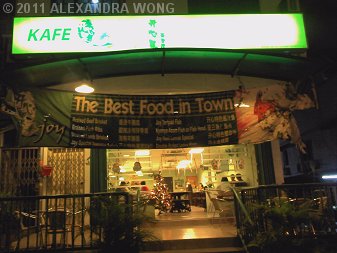I was initially worried that I wouldn't be able to appreciate the book due to my shallow understanding of Stephen King's body of work. The last - and only other - book of his I'd read was Pet Sematary, a terrifying tale of Indian graveyards and demon-possessed zombie pets (and people). In contrast, 11/22/63 is a different sort of animal, and it even ends... happily.
A little disappointed that no coupon was attached with it. RM87.90 is a bit steep, even if it's Stephen King.
Saving JFK
Stephen King's tale of time travel explores the possibilities in — and perils of — changing the past 'for the better'first published in The Star, 09 December 2011
A rule of thumb I follow regarding books: If the author's name is bigger than the title, caveat emptor.

The much-anticipated novel about a time-travelling English teacher who inherits a dying man's quest to stop the assassination of the 35th US President pretty much lives up to the hype that has surrounded it since the publishing world first got an inkling about it.
Jake Epping is, in his own words, not a crying man. But an essay by one of his adult students, janitor Harry Dunning, manages to make him weep. It's not (just) the atrocious grammar and spelling. It was a horrific account of how, as a child, Dunning survived his father's drunken, murderous rampage that claimed the rest of his family.
Then he meets Al Templeton, the owner of a diner that has a portal to an exact time and date back in time: 11.58am, Sept 9, 1958. Who cares how the portal came to be, as long as Templeton gets to buy cheap, good-tasting, chemical- and hormone-free beef from the good old days. A sceptical Epping goes through the portal, and falls in love with the root beer he buys at a store – no preservatives, Templeton guesses. We never know if it's A&W's.
Of course there's a catch. On his shopping trips back in time, Templeton had toyed with the idea of changing American history by saving JFK. But Templeton gets cancer before he can do anything, and he's not sure when his time will be up, so he appoints Epping as the heir to his mission. But when Epping has second thoughts after his attempt to fix Dunning's future backfires, Templeton commits suicide. With the weight of a dead man's last wishes on his shoulders, our sentimental English teacher takes a seemingly permanent step into the past.
King is said to have done heaps of research for this book. Through the words of Epping, now George Amberson back in 1958, we experience the life of an ordinary American in the golden post WWII era. Much of the book really is about how Epping/Amberson adapts to and lives in the past, which he does perhaps a little too well. We look into his head, see through his eyes, hear with his ears.
The book tries to help us experience those days. Store signs, newspaper headlines and billboards are announced in capital letters and different fonts. Phonetic spelling of some words in the dialogue goad us to read them aloud. Go on, say "beer” the Maine way: "beeyah”. It's fun ... for the first two times. Yes, I heard about the Easter eggs, too. However, I could only spot references to The Shawshank Redemption and It in the pages; fans of King will undoubtedly find more.
It's quite some time to 1963, so Epping/Amberson passes the time by teaching at a school in Texas. And getting involved with its pretty, popular librarian, Sadie Dunhill. But it's only a matter of time before someone discovers the truth about him.
This is quite a good read despite the heavy American flavour, the long drawn-out build-up to the confrontation with JFK's assassin, and the shocking consequences that follow, not to mention the multi-font all-caps assault on the eyes. The boring and incredible parts where Epping/Amberson stalks Lee Harvey Oswald and the explanation of time travel physics barely register on the disbelief suspension scale. It's Stephen King, after all.
Wish I could say you can't put it down, but if you're reading the hardcover version, you'll have to or you might develop a cramp bearing the weight of this 840-page tome in your arms. Looks like King threw just about everything he'd researched into this book.
Hints at a yearning for a rose-tinted past echo throughout King's almost fairy tale-like depiction of the US half a century ago, calling to mind the Camelot myth spun around JFK not long after his death. Perhaps the question, "what if Kennedy survived?” is a yearning for a return to those days, when a charismatic young senator took the White House against all odds and, later, as president, faced up to a belligerent world power an ocean away under the shadow of a mushroom cloud – and won a desperate gamble.
Not only does today's US hardly resemble that storied Arthurian realm, its people might also be wistful about a return to Camelot. King's 11/22/63 gives us a tantalising peek at such a possibility, but also cautions us that it is perhaps better to let the past be and work on the now – and towards the future.
11/22/63
Stephen KingScribner (2011)
849 pages (Hardcover)
Fiction
ISBN: 978-1-4516-2728-2
Categories:
Book Reviews,
The Star







